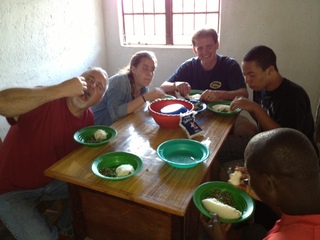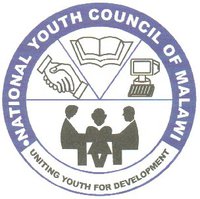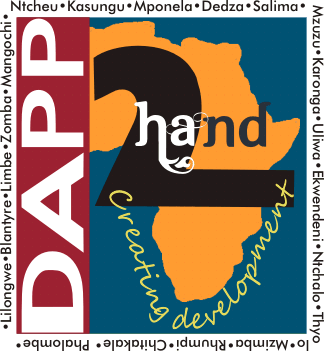“Orphan Care”
“Then the King will say to those on his right
‘Come, you who are blessed by my Father, inherit the kingdom prepared for you from the foundation of the world. For I was hungry and you gave me food….
‘Then the righteous will answer him, saying, ‘Lord when did we see you hungry and feed you…?’
And the King will answer them, ‘Truly, I say to you, as you did it to one of the least of these my brothers, you did it to me.'”
Matthew 25: 34-35, 37, 40
Bright Vision Orphan Care
The Orphan Care center is about a 40-minute drive in the other direction, through the city of Lilongwe and down several dirt roads and tracks. (However it took us about 90 minutes the first time we went because we got lost. Thank you, GPS for finally getting us there! “Recalculating!”)
When we finally pulled to a stop in front of the white-washed, tin-roofed main building a wave of colorfully dressed women spilled out the door and down the steps, surrounding us and briefly taking our hands. They were singing a beautiful song of welcome in Chichewe. It seemed surreal, like angels singing! How I wish I’d gotten a video of them!
Founder of Bright Vision, Stanley Chapota, welcomed us and then all the men came to shake our hands. (The men have a cool triple-grasp handshake that we quickly learned.) We said the Chichewa words of greeting that we’d practiced each time: “Muli Bwangi” and “Ndili Bwino.”
We had come with paint and brushes and rollers to patch and refinish the inside of the main meeting building, but first we had to be individually introduced and hear from each important man and woman in the village. All were eager to tell us about Bright Vision’s many outreach programs.
Finally we were able to break out the tools, crack open the 5-gallon paint can and begin painting.What fun it was, with the crowd of wide-eyed, curious children watching and laughing!
Attached to the building on one side, was a sort of makeshift semi-outdoors kitchen, where several women cooked maize porridge in a large metal pot for the children of the school and staff.
When all was ladled into bowls some older boys were handed the pot. They ran excitedly into the bush a little ways and – like children everywhere with their mothers’ mixing bowls – used their fingers to scoop out and lick the little that remained inside. (They even let me swipe a bit and taste it!)
We finally finished the painting, and after packing up the supplies, we started to say our goodbyes. But the generous people of Bright Vision had something different in mind. We were led to a table in a small room and given a meal.
It was rounded slabs of nsima again, but this was better than at the lake, and they served it hot with salt and a side bowl of cooked greens (mustard and celery).
Before we ate, Stanley brought around a cup and a couple bowls, and poured fresh water over our hands to let us wash up. We then did the favor for him and each other.
When we left, one of the men rode in the truck with us, making sure we found our way out to the main road without getting lost. We noted the turns and felt sure we could find our way back. Sure enough, we were able to drive to Bright Vision without mishap the following day. (Jon and Jana stayed in Lilongue this time to help the Floreens and Ayers with babysitting and fix-it projects.)
We had several things to do this time. Kalei shared his testimony to about 230 kids who’d come for class and the twice-weekly feeding program. Stanley interpreted with lively gestures and words.
I lettered Romans 5:8 (the verse our team leader chose) on the end wall of the room we painted, and we all took turns painting in the words. “But God shows his love for us, in that while we were still sinners, Christ died for us.” It was really hard to do on the rough, stucco-like surface, but we had a large group of kids watching and cheering us on.
Then it was lunch time. The women had prepared huge vats of nsima, plus a giant pot of cooked dried beans (that they’d picked over and cleaned the day before). They had at least 50-60 bowls filled by the time I arrived to help pass them out.
After a blessing the manic distributing began. Men tried to keep the 300+ children in two lines in front of the serving window, but they crowded in, pressing the little ones and waving their hands for bowls. Another man and I handed out the bowls as fast as the women could fill them. Then piles of empty ones started coming back. The women rinsed them and refilled them with the food.
Finally after what seemed like an hour (but was probably more like 20 minutes) the lines dwindled to an end, a good thing because the women were scraping the bottoms of the pots. Stanley explained that twice a year – at Christmas and Easter – they were able to feed the kids meat as well.
And then, we were once again led to the small room with the table, offered water to wash our hands, and fed the nsima, cooked greens and beans that they had graciously held back for us. We were liking the Malawi “staple” food more each time.
Afterwards all gathered again for lengthy farewells and thanks (“Zikomo!”), and then we shook hands with every man, woman, and child there! Whew!
When we considered all the good that Bright Vision was accomplishing for the orphans and “vulnerable” children in the Chamendenga area – dependent on the help and gifts of outside people and organizations – we were awed. It seemed like such a huge task, and yet, there were dedicated people like Stanley to take it on.
I was glad we had a chance to meet the three representatives from “Goods for Good” who had also come that second day to see the areas of need and how they might help. And I was glad for the small part our FBC Malawi Team was able to play in the work.
“Religion that is pure and undefiled before God, the Father, is this: to visit orphans and widows in their affliction, and to keep oneself unstained from the world.”James 1:27




